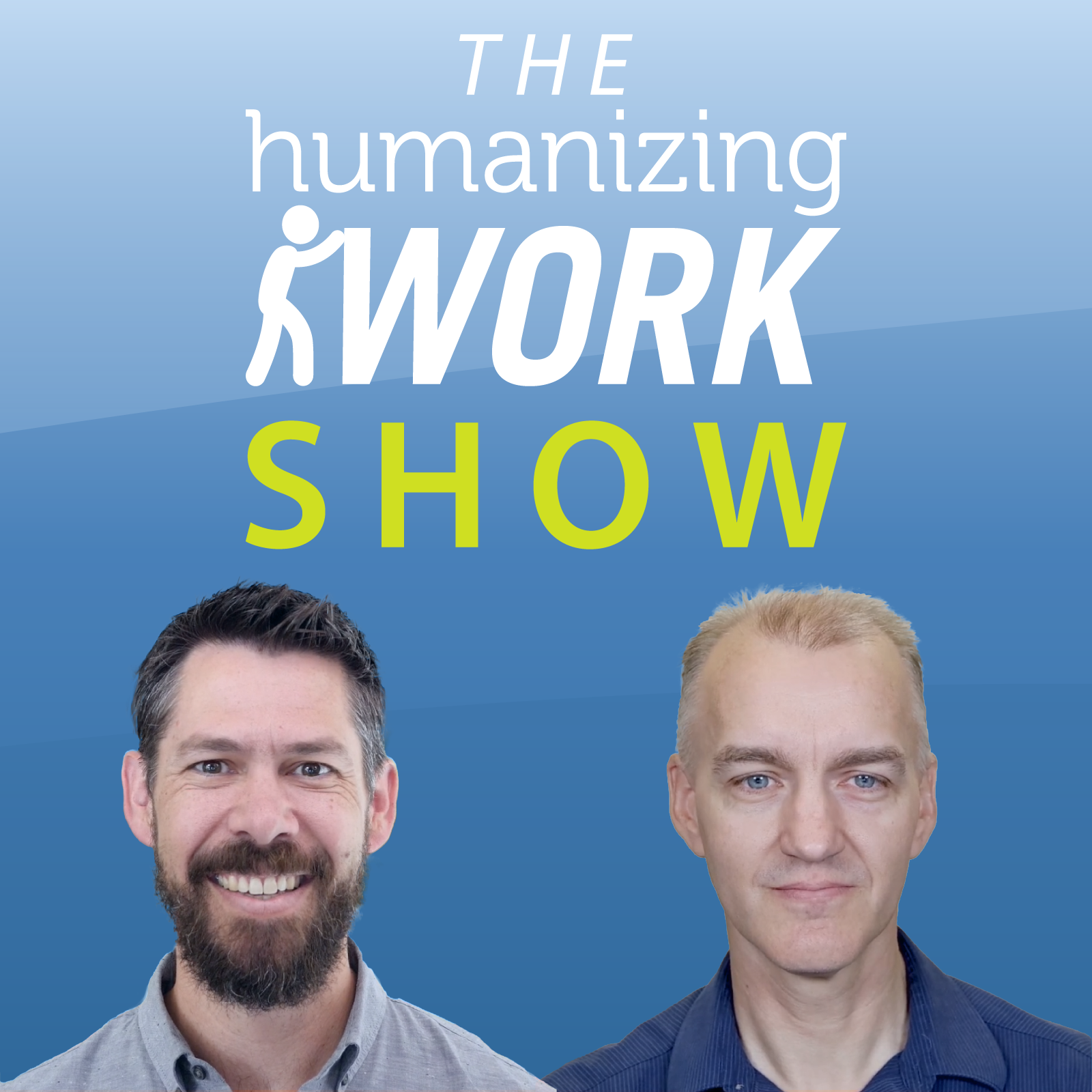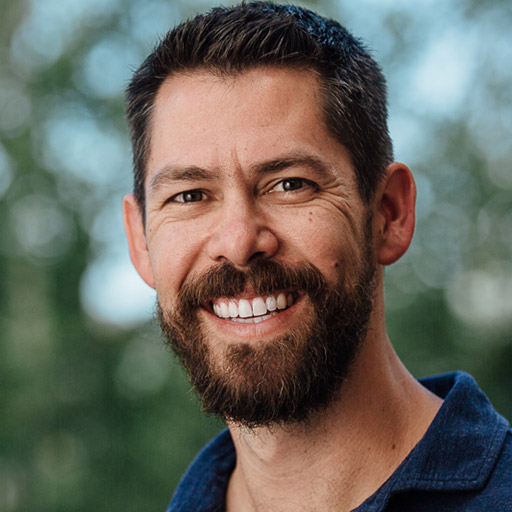Episode Transcript
Have you ever been on the receiving end of some feedback that stung just a little bit? Maybe it caught you off guard or it's something you'd been worried about someone saying, because deep down you knew it was true, which doesn't make it easier to hear, right? Well, that happened to me recently. Richard gave me some honest feedback about not following through on a commitment.
At the time, I wanted to defend myself. I had reasons! But the truth is I was already feeling bad about it and his courage to bring it up, kindly and clearly, made a more positive impact than I think either of us expected at the time.
That moment has changed the way I'm showing up in our work. So in today's episode, we're gonna go off script and talk about that experience and how well delivered feedback can set in motion what I'm thinking of now as kind of a productivity flywheel. There's more output, there's better quality, there's stronger, more resilient relationships on our team. And I've invited Richard to jump in here in a moment and then I'll share a bit of the backstory and we'll see where it takes us. I don't know what this experience was like for him, so I'm intrigued to find out. So I'm gonna grab Richard and then we'll be back.
Okay. Thanks for joining me on this, Richard.
Sure.
As you probably remember, a few weeks ago we had a meeting on the calendar to record an episode of this show, and it was kind of team related just to sort of, point you to the one I'm talking about.
Mm-hmm.
And I'd committed to having a script ready to shoot, but 10 minutes before the episode, I didn't have a script ready to shoot. Instead, that week I'd been busy with some client work, and creating some visuals for a new model we were working on, and updating proposals, and managing all the things we hadn't talked about in our weekly planning.
In addition to that, the script idea I'd started working on kind of blew up into something way bigger than I'd expected, and I was at least an hour of focused writing away from having something we could record. And even that might be a little bit optimistic.
So as the meeting time approached, all the reasons I hadn't delivered on my commitment to you started running through my head. Like, "well, you know, you can't predict how long it'll take to land an idea when you're in this creative space." And other work had emerged since I committed to, to this time, and, "I had a poor night's sleep last night and I was feeling a bit groggy." Just all the reasons.
And that's kind of the trap, right? What psychologists call the fundamental attribution error. Like when I miss a deadline, I have all of the logical reasons why I'm missing it. When somebody else does, it's because they're super flaky.
So, as you may recall, I messaged you on Slack and I shared all the reasons that this wasn't ready yet, and I asked if you wanted to jump on the call and sort of collaboratively decide what to do next. Is this all ringing a bell now?
Yeah, I remember that.
Okay. When we got on that call, we decided to sort of pivot away from the bigger team related topic and focus on one specific part of it, which coincidentally is actually about giving feedback. And then I committed to doing a script on that idea with a plan to shoot it the next day. Right? So that new script on feedback, something we've taught and coached many times was something I was pretty confident I could summarize pretty concretely pretty quickly.
Then, as we were sort of talking through the shape that that feedback episode might take, I remember you pausing and saying, "Hey, speaking of feedback, would it be okay if I shared some, some feedback with you?" And I'm curious in that moment, what made you decide to bring it up? I imagine it wasn't easy and probably felt, uh, a little angsty or uncomfortable.
Right. I think one reason I brought it up there was I just felt like we couldn't do a show with integrity about feedback when I was sitting on something that was bothering me. So it always feels like we need to live what we're teaching and we, we generally do to the best of our ability. And that was a, a glaring mismatch. "We're gonna shoot this show about a thing that we are avoiding." Okay, can't do that. I think it was probably also coming anyway, because we'd gone on a pretty long string of missed commitments around preparing episodes for shooting.
Because for a while we'd divided up our work where I mostly write newsletters, you mostly shape the shows that we're going to shoot. And I realized I'd gotten to a point where I was trying to empathize and come up with the reasons why you were missing the deadline, and I was also blocking my calendar for multiple hours after anytime you would schedule to shoot an episode knowing we probably wouldn't actually be shooting. We'd be finishing the scripting and then finally end up shooting. And I realized that's probably not healthy for me to be assuming that you're not going to follow through on your commitments.
Yeah.
We need to adjust how we manage commitments and accountability in some way, and that became really clear in that moment. So I wanted to figure out how to talk about that.
Yeah. And if I remember correctly, that's how you framed it. I think you shared that just, just here is my experience. "When I see one of these on my calendar, I end up blocking time after it. 'cause I don't trust that you'll have the script ready."
If you think about how we frame feedback, that's a really nice way to frame it because what you're describing is what the experience was like for you. I can't argue with that. I can't say, no, you don't.
And it was a way you might not be aware of.
Right, right. So it, it gave me new information and it was something that I couldn't really debate or explain away.
Mm-hmm. Now, how did it feel for you when I brought that up?
As soon as you brought it up, like I had already been feeling bad about that anyway, that same pattern that you mentioned. It just felt like, week after week, I would get close, but then the day before, I'd get burned out or tired and I would say, well, I'll pick it up tomorrow. And, and I always had the best intention to get up a little bit earlier and, you know, do that last little bit and put it, put it over the finish line.
But I also was feeling pretty bad about my own self, right? Like, I, I don't, I like to live in integrity too, and I like to keep my commitments and I hadn't been doing that. And so in some ways it was almost a relief that you, you mentioned it. It's like, "oh good, we can finally talk about this now."
It's embarrassing, right? To get feedback like that. We all wanna be superheroes and have no weaknesses. But it was also a relief to have it out in the open so we could talk about it and, and I think a relief to have out in the open that wasn't really judgmental. It wasn't, "Peter, you're so flaky. Why do you keep doing this?" No, it was just, here's what I'm experiencing and that doesn't seem like a good way to work.
Yeah, I know one thing I'm always trying to avoid with feedback is the generalizing. Like "you always..."
Yeah.
And I'm reflecting on, on that conversation, I still ended up generalizing, but it was more about "here's how I'm behaving now. I've noticed I'm doing this."
Mm-hmm.
"And it seems to be because of this pattern I'm seeing." So it was generalizing about the effect, but not ascribing the behavior to you in a you always kind of situation.
Yeah.
And did that change things?
Oh, for sure. And I, it's hard for me to predict if it would've been different if you had brought it up in a less skillful way, because the way you brought it up worked.
Hmm.
It did exactly what it needed to do, right? It, it got it out in the open. I may have been sort of hoping that you were fine with everything, right? That, oh, now we get to collaborate on this call about what the final script's gonna look like. Maybe that's a good thing, right?
Yeah.
But it allowed me to sort of get over the delusion that this was fine and address it, right?
Mm-hmm.
And the reason I wanted to talk about that today is because I expected, you know, when you get good feedback that things get a little better. But it felt like a much bigger impact than I had anticipated, at least my sense of how things have gone on our team since then. And it's been, you know, close to a month now, you know, it's getting a, a few weeks in, close to a month. I have just felt so much more productive since then, and I've also felt like the energy on the team was better, even though, you know, as a business, like all businesses, we go through ups and downs, we go through challenges, we go through good things, and, and some of the challenges that we've been talking about have felt lighter.
Mm-hmm.
Than they had before. So it just felt like it had this flywheel impact where your willingness to say that thing impacted a lot of aspects about our team. And so I've been sort of noodling on why that is. What, what was so powerful about it? I think to a certain extent it was, you know, it reminded me of who I want to be– somebody that doesn't let people down. I want to be a man of my word. I want to have integrity. And I care about the outcomes we're creating with the Humanizing Work Show, and all the work that we do. And I want to, I want to be in service of doing it well.
And it made me realize that as I recommitted to do all those things, my sense of mastery went up in, in the use of that word from Drive by Dan Pink.
Mm-hmm.
Right, my sense that I'm good at the work I do, and I'm getting better at it. And so that's one of the core motivators, and so my motivation went up a little bit. So at least that's how it's felt to me. Like it's just felt like things are better since then.
Mmm.
In, in a way that was surprising to me, and I'm curious what you've noticed.
I've noticed that for sure. And I don't think it's just you following through more reliably on these commitments.
Right.
But I, I think it's that when there's a thing on a team that everybody knows, but you don't talk about, I think it affects everybody's ability to make and follow through on commitments. And so we're just
mm-hmm
less likely to want to work on a thing together. We're less likely to make commitments that will involve all of us because we don't believe somebody's going to follow through on it. I think that's the flywheel effect when each of us is able to make commitments and hold each other accountable for commitments. We're now able to take on bigger things that depend on all of us working together, and that creates its own energy.
Mm. Right.
So I, I think we've all gotten more productive and more collaborative as a result of not having, like, to overstate it like, 'well, if Peter's in the middle of this, it's probably not gonna happen.'
Right, right.
And, it was never that bad, but a small amount of that, even that doubt about somebody else following through leads to, well, "maybe I don't really need to work as hard on my bit. 'cause his won't be ready in time anyway and we'll just eventually get to it."
Mm. Mm-hmm. Yeah. It seems like we all trust each other a little bit more than we did a month ago.
Mm-hmm.
Which is, which is great.
You can see how important this would be on a Scrum team where you're going through this recurring cycle of making and following through on shared commitments that involve everyone with the planning and review cycle. And as soon as you don't trust somebody on the team to follow through, no matter how good their excuses are, you're gonna see the commitments go down and you'll probably see the team getting to the end of every sprint, "oh, we didn't finish. We'll just carry it over. We'll keep going." And probably it's not just the team, it's probably some conversations that need to happen within team members.
Uhhuh. Yeah, there's almost a Total Quality Management aspect of this, that if there's any defect in the relationship, the whole thing's gonna suffer until you fix the defect. It's like, you should stop the line, fix the trust defect, and then move on, because that's just gonna slow everything else down.
Mm-hmm. I think that's true.
Giving good feedback should lead to better results, right? It's why we do it, even if it feels uncomfortable. And we should see improvements in the quality of work and more alignment as we help people understand how their behavior is impacting us. But I think I underestimated just how big the impact could be. And the experience of going through this with you and the team has caused me to realize that when feedback is given well, it serves at least three purposes as I've reflected on this experience.
First, it serves the person's growth. So I learned and got better through your feedback. So it's serving my own growth and my own capability. Second, it improves the quality of the work itself. So the things I'm making are better quality now than they were before because of that increased emphasis on getting them done on time and, and doing them well.
Mm-hmm.
And then third is that it strengthens the relationship. I trust you that you'll say something if you're frustrated, and I'm assuming you trust that if I say I'll have something done, now I'm gonna honor my commitment.
Right.
Right? And I think improving all three of those areas, like individual growth, quality of the work, quality of the relationship, that's what is spinning the flywheel, so to speak. Where that individual capability, the work quality, the relationship strength, are all positively reinforcing each other.
Right, and for people who are listening, that flywheel is kicked off by a decision to speak up in a way that's, like we shared a few episodes ago on feedback, true, useful, and kind. So if there's a conversation you've been avoiding, maybe it's time, not to unload or vent or call somebody out just so you can feel right, and justify how you're better. But to give someone the information they need to make things better and to address an emerging relational barrier. And when you do it well, you might just find you haven't just given feedback, you've unlocked a better version of your team, which is what happened for us, and that's why we're sharing this story.
As we've shared this example, I'm guessing that many of you have been thinking about a situation or a dynamic that's been frustrating you, Something you've been waiting for the right time to bring up. Who do you need to talk to and what's the topic? What would it take to bring up that topic in a way that was true and useful and kind?
Based on our experience, it's worth doing, even if it feels clumsy. As long as you're well intentioned and open to however that person ends up responding, you're gonna get a good result and you might get a huge boost that sustains and builds over time. Richard, thank you for being willing to gimme feedback.
Of course.
And those tuning in, thanks for letting us talk through this together. We hope you got something out of this and we hope that you'll give better feedback and, we'll see you next time.




